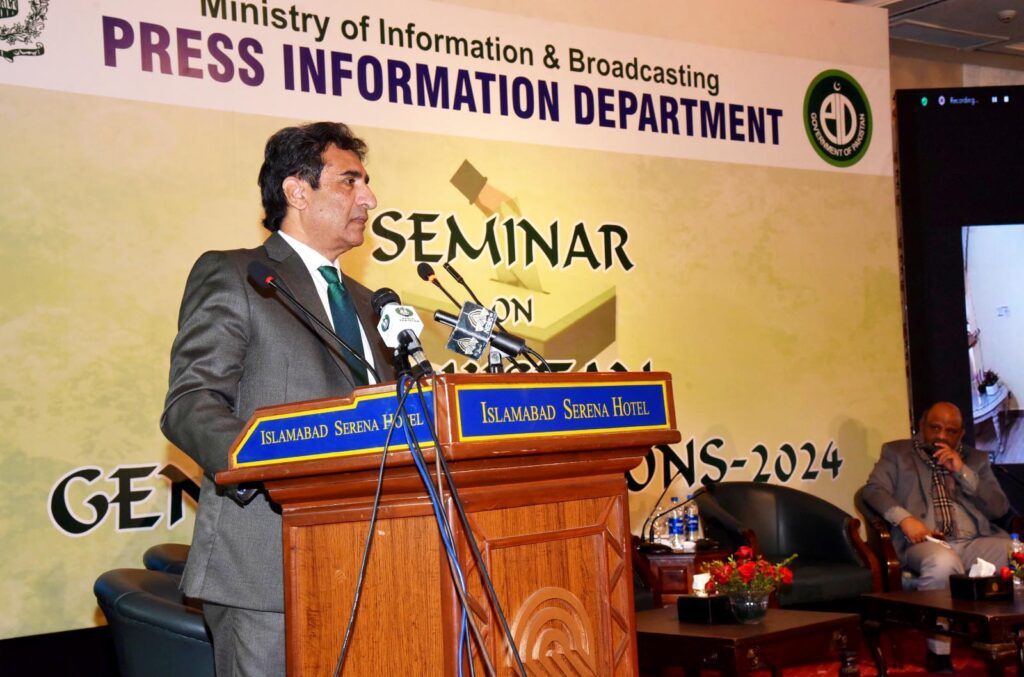ISLAMABAD, Jan 11 (APP): The Speakers on Thursday urged the country’s political parties to adopt long-term planning for sustainable economic growth. The Charter of Economy (CoE), is mandatory for achieving fast economic growth in this country, they said while addressing a seminar organized under the auspices of the Information Department on “Election 2024 Economic Reforms, Agenda of Political Parties” held here. The speakers emphasized on developing the country’s economy through human resource development, technology and value addition by adopting short, medium, and long-term planning.

Caretaker Federal Minister for Information and Broadcasting Murtaza Solangi was the special guest on this occasion. Federal Information Secretary Shaheera Shahid and Principal Information Officer Tariq Mehmood along with senior officers of the Ministry of Information were also present.

Expressing views on the topic of economic perspective, a well-known economist of International Islamic University Dr. Noor Fatima said that economy is an important challenge for the new government.
Managing Director, SDPI, Dr. Abid Sulhari said that National Economic Security Council should be formed and next government should also include the opposition leader in the SIFC. He said that political parties had given visions in their manifesto. Political parties should be well aware of the problems of common man. They (political party leaders) will have to focus on controlling inflation, developing the private sector, improving governance and bringing out-of-school children back to school. He said that a documented economy is the need of the hour to achieve results in every sector. He said that it is the responsibility of next government to focus on Information Technology, the energy sector and civil service reforms.
He was of the opinion that universities and professional institutes should be integrated with industries.
An economic expert Dr. Khalid Waleed said that economy, energy and environment are basic issues that need special attention. He said that there is a need to tackle unemployment, financial and trade deficit issues. He said although, tax revenue is increasing but other matters should be addressed by adopting a comprehensive strategy.
He said that energy and environment are important sectors for the government. He said reforms in the energy sector is necessary. The political parties should clearly state how they will make long-term policies and decisions.
He said that the share of agriculture in the country’s GDP is 20 percent, while the share of services is close to 60 percent. In the contrary, the agriculture sector is providing more jobs and employment. He said that providing skills to 60 per cent of the youth in IT sector would be an important step of the new government. Introducing modern technologies and boosting the industrial sector is essential to achieve objectives, he said.
He said that It is imperative to provide skills to labor force according to the requirements of the new era.
Dean of Pakistan Institute for Development, Dr. Shujaat Farooq said that reforms, the economy, debt, and sustainability are not included in the manifesto of most of the political parties. We have to integrate our universities and professional institutions with the industries, he said. He said that budget of BISP is more than Rs 400 billion but it is not creating economic opportunities. Similarly, he said, there was no planning for health facility program. The focus, he said should be given to improve governance. In order to steer country out of the economic challenges, he said, it is necessary to ensure a growth of 7 to 8 percent in the gross national product on an annual basis.
He said that after the elections, the new government will have to approach IMF. Pakistan will have to complete the IMF program, he said. He further stated that new government will have to complete second review of the IMF.
He said that the program with IMF will not solve our problems. He said that steps have been taken to reduce dollar rate and smuggling from the platform of SIFC.
In a discussion on the topic of “Media from the perspective” of the seminar, the well-known journalist Mr. Shahbaz Rana said that Pakistan needs a loan of $ 25 to $30 billion every year, the budget deficit is close to Rs 8000 billion, the poverty rate is 40 per cent, unemployment is at the rate of 8 to 10 percent.
He said that the debt to GDP ratio is 75% which should be 50%, these are the facts of our economy, how the political parties deal with these facts.
He said that promises are made in the manifesto of most of the political parties, but it is not possible to implement them. Journalist Mehtab Haider said that next government will have to go to the IMF and there are also possibilities that a condition will be imposed to restructure Pakistan’s debt. He said that reforms in energy and civil service are necessary. Senior journalist Hafiz Tahir Khalil said that new government will have to focus on issues of energy, food security, and the education sector besides issues of fake news on social media.

